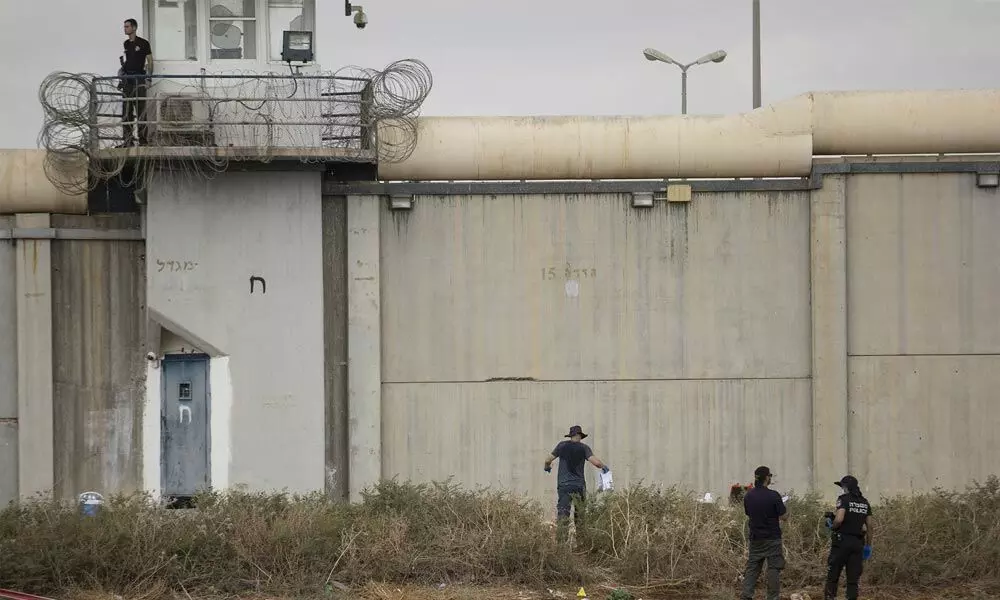What a daring prison break taught Israel
The struggle for freedom from the occupier is continuous and extended, inside the prisons and outside
image for illustrative purpose

The six escapees managed to dig a tunnel from their cell into a space under the prison and crawled to freedom though a sewer pipe with nothing but the clothes on their backs. They evidently expected their brother Palestinians to hide them, instead, they were turned away
ON the eve of the Jewish New Year, six Palestinian terrorists originally from the West Bank somehow escaped from an Israeli maximum security prison, spreading fear and panic. It's provided a stress test not just of Israeli security, but also Arab Israeli sentiment.
The army, police and Shin Bet, Israel's version of the FBI, set up road blocks, unleashed tracker dog and employed its famed technology to pursue the convicts. They were especially concerned about Zakaria Zubeidi a one-time commander of Al Fatah forces in the northern West Bank town of Jenin, who is accused of ordering the deaths of six Israelis.
That night, devout Jews gathered in guarded synagogues and prayed for the safety of their communities. Meanwhile, throughout Gaza and the West Bank, Hamas and Islamic Jihad (five of the six prison breakers were from that group) cheered the desperados and called upon the Arab citizens of Israel to do their national duty by protecting the heroes.
That was a test. Last May, when rioting broke out in Israel between Jews and Arabs, Hamas called it a first step in its strategy to reconnect Israeli Arabs with the people of Gaza and the West Bank.
Hamas Spokesman Fawzi Barhoum reminded the Arabs of Israel that, "the struggle for freedom from the occupier is continuous and extended, inside the prisons and outside." Many Jewish Israelis waited in trepidation for a repeat of the events of May.
It hasn't happened. Israeli Arabs may have felt a degree of pride in the daring of the escapees, but they did not express it in public demonstrations of joy.
The six escapees managed to dig a tunnel from their cell into a space under the prison and crawled to freedom though a sewer pipe with nothing but the clothes on their backs. They evidently expected their brother Palestinians to hide them, feed them and help them to get to safety in the West Bank. Instead, they were turned away. Four of the prisoners, including Zubeidi, were reportedly identified by Israeli Arabs. Palestinian hackers later plastered smiles onto the grim faces of the men being taken into custody but nobody was fooled.
Two jail breakers are still at large, and may have crossed the Green Line into territory controlled by the Palestinian Authority. But the PA is cooperating with Israel and this will likely end in capture. Hamas declared a "Day of Rage" in the West Bank on their behalf, but it was sporadically attended and easily contained.
The leaders of the Joint List, Israel's anti-Zionist Arab party, were uncharacteristically restrained. Party leader Ayman Odeh declined media invitations to call the jail breakers "heroes" and retreated into a John Lennon-esque imagining of a day when all prisoners would go free. Mahmoud Abbas, the leader of the integrationist Arab Ra'am faction in the government coalition, said nothing at all.
The lack of revolutionary enthusiasm among Israeli Arabs came as no surprise to Prof. Tamar Hermann, a Senior Research Fellow at the Israel Democracy Institute and the Academic Director of the Viterbi Family Center for Public Opinion and Policy Research. She is currently working on a major survey that includes the attitudes of Israeli Arabs and Jews.
"The people who hoped it was the beginning of some new Palestinian uprising were badly mistaken," she says. "The large majority of Israeli-Arabs are not Islamist fanatics or anti-Jewish ideologues. They want to work at Microsoft or send their kids to medical school. Are they Zionists? No, they are pragmatists. They want to share in what Israel has to offer. They want to be included."
Hermann knows from her polling that a majority of Israeli-grievances are based on discrimination in housing, employment opportunities, and too few educational opportunities. But perhaps the single biggest practical problem facing the Arab community is endemic crime. In the first eight months of 2021, more than 80 Israeli Arabs died in intra-communal murders. Most were victims of underworld clan warfare.
Successive Israeli governments have watched this trend grow with a sense of apathy, as someone else's problem. It was seen by Jerusalem as a no-win issue. The gangsters were local people, members of large clans. Citizens feared them, but they didn't necessarily want Jewish cops to come in to arrest their relatives. Besides, cooperating with the cops in such an intimate setting could be life-threatening.
The Bennett government, at the behest of Arab mayors and civic leaders, has adopted a more active policy. Israel's first Muslim Police Chief Superintendent, Jamal Harkoush, has been named head of the Division for Crime Fighting in Arab Communities. Just a few days into his new job, he and his wife were sitting on the balcony when gunmen fired a volley of bullets at the house (they were unharmed).
The prison break has left unanswered questions. How could a supposedly "supermax" prison be made to look like a county jail? How have two fugitives thus far evaded the Israeli dragnet?
But at least one nagging question appears to have been answered. Israeli Arabs are not now, and do not seemly likely to become, recruits in an Islamic holy war against Israel. (Bloomberg)

